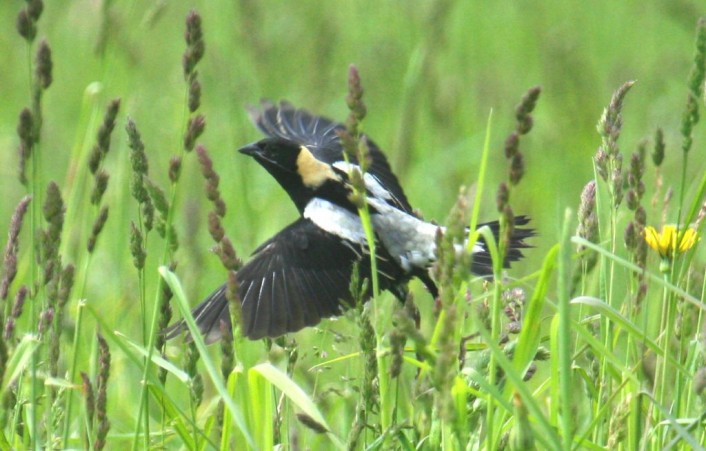Conserving species under threat is always difficult, but especially so when their habitats are on active farmland. When a scientific assessment four years ago concluded that Ontario populations of bobolinks and eastern meadowlarks were plummeting, many farmers worried that regulations to save the birds under the Endangered Species Act might threaten their incomes. Restrictions on cutting hay or pasturing livestock during nesting season could be very bad news for hard-pressed beef farmers.
A joint proposal to the province from environmentalists and farm organizations resulted in the establishment of a Bobolink Round Table to come up with recommended solutions to this complex dilemma. Couchiching Conservancy has been represented on that Round Table, in part because we have experience “on the ground” with these species and some of the farmers who host them.
The Round Table’s third report, which was recently submitted, lays out a package of measures intended to help the birds without crippling farmers. They recommend that an existing three-year exemption from the Endangered Species Act for agricultural activities be extended for a further ten years. As well as providing certainty for farmers, this exception from restrictive regulations recognizes that it is farmers who maintain the hay and grassland habitats that these birds need to survive.
By itself, this exemption is not going to help restore bobolink and meadowlark numbers. The Round Table also urged the provincial government to fund ongoing incentive programs to encourage farmers to adopt bird-friendly practices such as cutting hay later in the season or improving pasture management. Outreach and recognition programs for good stewardship are also needed, as well as research projects to identify and assess best practices.
Developers, such as those who build subdivisions or green energy projects on grassland habitats, are not exempt from regulations. However, they are allowed to remove bobolink and meadowlark habitats if they re-create similar grasslands elsewhere, often in cooperation with conservation groups. Over the past year, Couchiching Conservancy has signed agreements with three developers to provide replacement habitats on Bluebird Ranch, providing funding for habitat enhancement work we could not otherwise afford. The Round Table has strongly supported this approach, and worked on mechanisms to make this process work efficiently.
The initial reaction from government officials to the Round Table recommendations has been positive, and Ministry staff are now in the process of examining their implications and briefing the senior officials who will decide the government’s response.
To some nature-lovers, the Round Table’s approach may seem to have caved in too much to the powerful agricultural industry. Certainly their recommendations represent a compromise. But without the goodwill and participation of farmers, the future for bobolinks, meadowlarks and other grassland birds is bleak. We hope and expect that livestock farmers, including those in Simcoe and Victoria counties, will continue to learn about and help these birds as part of good stewardship of their lands.
Written by Ron Reid, Carden Program Coordinator

